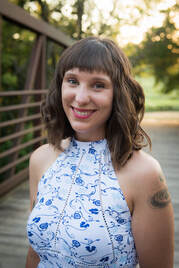|
An interview with Kelsey Bolton, Continuing Professional Development Consultant, Gundersen Health System by Anna Morgan, RN, BSN, MPH, NaRCAD Program Manager Tags: Detailing Visits, COVID-19, CME, E-Detailing, Smoking Cessation, Substance Use  Anna: Hi, Kelsey! Thanks for taking the time to chat with us today. Can you tell us a bit about your academic detailing program in Wisconsin and your role? Kelsey: I’m a Continuing Professional Development Consultant in the Continuing Medical Education (CME) Department at Gundersen Health System. Gundersen Health System is a teaching hospital with a multitude of specialties that serves patients in Wisconsin, Minnesota, and Iowa. As part of my CME work, academic detailing stood out as an effective tool to disseminate our information and meet our clinicians’ educational needs. We started our detailing program last fall and have been focused on tobacco cessation. The detailing intervention is a spinoff of a performance improvement project we are working on for diabetes. I’m currently a one-woman show; I’m the program coordinator and the sole detailer. I detail physicians, NPs and PAs across the health system. Anna: Wow, it’s incredible that you’ve been able to build your detailing program from the ground up! Can you tell us what that’s been like? Kelsey: Academic detailing was a new concept to me prior to being introduced to it by my former manager, who sent me to the NaRCAD training in May 2019. Academic detailing is not a well-known concept in our hospital system. It was difficult to get past the gatekeepers and “enlighten” them about academic detailing. There are still misconceptions when I walk into a room for a meeting with a clinician – they often think that I’m a drug sales rep, that I’m an internal quality control person, or that I’m there for punitive reasons. I must quickly refute that and explain that I’m there to support and unburden them, not to make judgments about their work. Anna: Those misconceptions are quite common when starting a new academic detailing program. How are you able to “enlighten” the gatekeepers? Kelsey: It was bumpy at first and we tried a few different approaches, but I think we’ve finally been able to smooth it out. I have an advantage because I’m internal and I’m contacting clinicians from an internal email or phone number. I’ve also had our medical program coordinator, the doctor who is partnering with me to learn the clinical information, send out emails to gatekeepers prior to my detailing visits. Anna: Stakeholder buy-in is imperative when building a new detailing program.  Kelsey: Absolutely. Building relationships with key stakeholders has made all the difference. The medical program coordinator I work with, as well as other experts in the organization, helped me curate my detailing aid and key messages. I practiced my detailing sessions with these stakeholders before going out in the field. It was an easy way to build relationships and get them on board – it only took a 15-minute practice detailing session! I’m also fortunate enough to have support from senior leadership. They’ve been able to open doors by letting people throughout the organization know that they support the academic detailing work I’m doing. Anna: It sounds like both managing your academic detailing program and being in the field has helped you be successful in getting your program off the ground. What has it been like to grow and manage your AD program? Kelsey: It’s like herding cats! The detailing program is 25% of my workload, so completing all the administrative work plus the detailing visits is quite a commitment. By the end of this year, I will have detailed over 200 clinicians. “Marathon detailing” has put me in a groove. It has definitely been challenging, but I appreciate that I know the ins and outs of it now – both the administrative tasks and the field work. I feel prepared to help train others. I plan to start training one of my colleagues to become a detailer in the fall. Anna: When thinking about team expansion, it’s also important to think about the impact of COVID-19. How has COVID-19 impacted your program? Kelsey: We paused our detailing visits for about 3 months, and by the time we started talking about bringing them back, NaRCAD was putting out a lot of information about e-Detailing. Before COVID, I had barely done anything with video calling, but getting thrown into working from home, we jumped into a lot of video calls. I learned how to work virtually on the fly, which made it easier to adapt to e-Detailing. I did a few practice e-Detailing sessions with my colleagues and I’ve now successfully completed several visits virtually. The NaRCAD webinars were a lifesaver. We plan to continue e-Detailing until it’s safe to return to in-person visits. Anna: A lot of academic detailing programs had to adapt quickly to e-Detailing during the pandemic. What does the future look like for your program?  Kelsey: For the more near future, we are working on collecting data for the tobacco cessation campaign to eventually publish research on the efficacy of the academic detailing intervention. We’re going to pull patient data from the EMR, as well as look at the qualitative data from the evaluation surveys. This research will help inform our organization on the benefits of academic detailing as an educational intervention. We would also like to continue the program with other strategic initiatives like substance use disorder, social determinants of health, and cancer screening. I have a soft spot for topics similar to tobacco cessation that are sometimes discouraging to clinicians because they don’t feel like they can make a difference. I know that through detailing, I’m able to give them a fresh take on these topics, and reinvigorate them in providing the best care for their patients. Have thoughts on our DETAILS Blog posts? You can head on over to our Discussion Forum to continue the conversation!  Biography. Kelsey Bolton is a Continuing Professional Development Consultant in the CME department at Gundersen Health System in La Crosse, WI and the program lead for its Academic Detailing program. She received her Bachelor of Arts degree in Communication Studies in 2015, Healthcare CPD Certificate in 2019, and is currently pursuing her Master’s in Organizational Leadership. She has completed over 100 detailing visits and is presently conducting a research project on the efficacy of tobacco cessation academic detailing.
2 Comments
Allyson Schulz
8/7/2020 08:58:47 am
Great article! Kelsey highlights a great strategy of using a doc to "pitch" the program...wish we had that option. My next best idea is to ask for referrals - will try that out at the end of my first detailing cycle later this month - fingers crossed!
Reply
Anna Morgan
8/7/2020 10:12:52 am
Thanks for your message, Allyson! Asking for referrals is a great idea, as well as identifying champions. Let us know how it goes!
Reply
Leave a Reply. |
Highlighting Best PracticesWe highlight what's working in clinical education through interviews, features, event recaps, and guest blogs, offering clinical educators the chance to share successes and lessons learned from around the country & beyond. Search Archives
|
